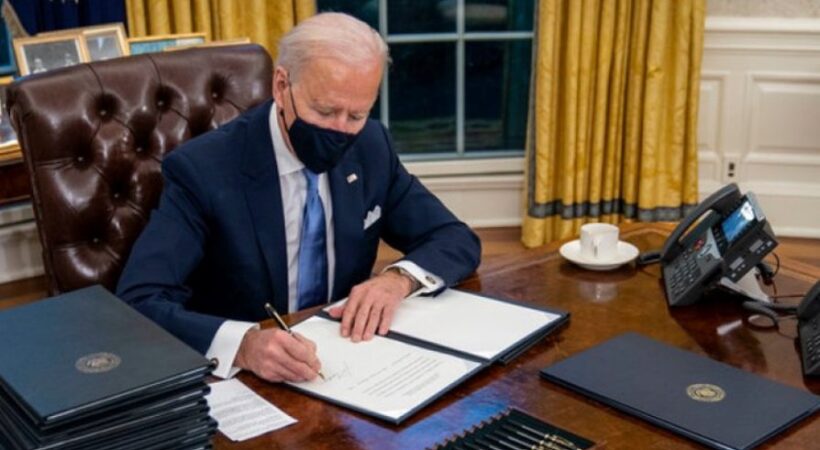Biden sends immigration reform bill to Congress on his first day in office

Photo: Twitter
As anticipated, Joe Biden started reversing the Trump policies including controversial immigration policies on his first day in office as President after sworn in.
According to PTI, Joe Biden has sent the much awaited comprehensive immigration bill to Congress which proposes major overhauls to the system, including granting legal status and a path to citizenship to tens of thousands of undocumented immigrants and other groups and reduce the time that family members must wait outside the US for green cards.
The immigration bill is called the US Citizenship Act of 2021 which modernizes the immigration system, PTI reported quoting a White House official.
According to the report, the proposed bill will eliminate the per country cap for employment-based green cards, a move that would benefit thousands of Indian IT professionals whose current wait period for legal permanent residency runs into several decades.
“Today President Biden sent an immigration bill to Congress. The US Citizenship Act modernises our immigration system. It provides hard-working people who have enriched our communities and lived here for decades an opportunity to earn citizenship,” White House Press Secretary Jen Psaki told reporters at a news conference, PTI reported.
“The president’s priority reflected in the bill are to responsibly manage the border, keep families together, grow our economy, address the root causes of migration from Central America and ensure that America can remain a refuge for those fleeing prosecution,” Psaki said.
The bill will stimulate America’s economy while ensuring that every worker is protected. The bill creates an earned path to citizenship for immigrant neighbours, colleagues, parishioners, community leaders, friends, and loved ones – including Dreamers and the essential workers who have risked their lives to serve and protect American communities, the White House said.
The term “Dreamers”, which is used for the undocumented immigrants living in the US illegally, came from the DREAM Act, a bipartisan legislation that was first proposed in 2001 to provide citizenship to them under certain conditions. It is estimated that some 11 million undocumented people are living in the US.
According to the White House, the bill clears employment-based visa backlogs, recaptures unused visas, reduces lengthy wait times, and eliminates per-country visa caps.
It makes it easier for graduates of US universities with advanced degrees, in the Science, Technology, Engineering and Mathematics (STEM) stay in the US; improves access to green cards for workers in lower-wage sectors; and eliminates other unnecessary hurdles for employment-based green cards.
The bill provides dependents of H-1B visa holders work authorisation, and children are prevented from “aging out” of the system. The bill also creates a pilot programme to stimulate regional economic development, gives DHS the authority to adjust green cards based on macroeconomic conditions, and incentivizes higher wages for non-immigrant, high-skilled visas to prevent unfair competition with American workers.
The Citizenship Act create an earned roadmap to citizenship for undocumented individuals. It allows undocumented individuals to apply for temporary legal status, with the ability to apply for green cards after five years if they pass criminal and national security background checks and pay their taxes.
Dreamers, TPS holders, and immigrant farmworkers who meet specific requirements are eligible for green cards immediately under the legislation. After three years, all green card holders who pass additional background checks and demonstrate knowledge of English and US civics can apply to become citizens. Applicants must be physically present in the United States on or before January 1, 2021.
The Secretary of the Department of Homeland Security (DHS) may waive the presence requirement for those deported on or after January 20, 2017 who were physically present for at least three years prior to removal for family unity and other humanitarian purposes.
Lastly, the bill further recognises America as a nation of immigrants by changing the word “alien” to “noncitizen” in the immigration laws. The bill reforms the family-based immigration system by clearing backlogs, recapturing unused visas, eliminating lengthy wait times, and increasing per-country visa caps.
Indian IT professionals, most of whom are highly skilled and come to the US mainly on the H-1B work visas, are the worst sufferers of the current immigration system which imposes a seven per cent per country quota on allotment of the coveted Green Card or permanent legal residency.
It also eliminates the so-called “three and 10-year bars,” and other provisions that keep families apart. The bill further supports familes by more explicitly including permanent partnerships and eliminating discrimination facing LGBTQ+ families.
It also provides protections for orphans, widows, children, and Filipino veterans who fought alongside the United States in World War II.
Lastly, the bill allows immigrants with approved family-sponsorship petitions to join family in the United States on a temporary basis while they wait for green cards to become available.
The bill includes the ‘NO BAN Act’ that prohibits discrimination based on religion and limits presidential authority to issue future bans. The bill also increases Diversity Visas to 80,000 from 55,000.
The bill among other things expands family case management programmes, reduces immigration court backlogs, expands training for immigration judges, and improves technology for immigration courts, the PTI report said.















